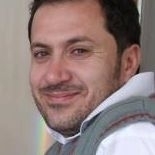The huge stream of people who went to welcome the Kurdish Syrian youth activist Shebal Ibrahim in Qamishli city on May 29th, 2013 was not a surprise, given that Ibrahim had been a leader for the on-going protests against the Syrian regime in the city since the beginning of the revolution. His arrest on September 22nd, 2011 was considered a sign from the regime directed at the entire youth movement in al-Hassakeh Province. The regime practiced systematic oppression of those young people. Shebal was released from Saidnaya military prison and welcomed by tens of thousands of people in the city from all social factions.
Background
Ibrahim comes from a Syrian Kurdish family in Qamishli City, where he was born in 1978. His family was close to the Kurdistan Democratic Party, a very conservative Kurdish national party led by the Barzani family for about a century. Shebal's uncle, Nasr Eddin Ibrahim, holds the general secretary position in the Kurdish Democratic Party in Syria, which is the Syrian branch for the aforementioned party. In contrast to his family's history, Shebal joined in the early 1990s the (Kurdish) Democratic Union Party, a Kurdish national leftist Marxist party, which resisted the conservative clannish Kurdish tendencies. Ibrahim became an activist in the party, especially after it merged with its counterpart, the Kurdish Left Party, and established the Azadi Party.
Ibrahim joined in 1998 the intermediate medical institute at Tishreen University in Latakia, in the medical analysis department. After he finished his studies, the government refused to employ him in state institutions. This was due to his political activities during college. Ibrahim’s membership in the Kurdish movement continued until the end of 2010.
During the revolution
Since the beginning of the Syrian revolution, two essential challenges have emerged. The first one was the ability to transcend the weary, traditional political patterns nationwide; the second was related to its ability to spread at a national level in order to form the largest national bloc in the country.
Those two conditions were very hard to achieve in a city like Qamishli. The Kurdish political disunion was profound, while the number of Kurdish political parties in the city was over twenty at the start of the revolution. Furthermore, the two other popular bases, the Arab and the Syriac, did not have any real political presence. The most challenging matter was creating general outlines and slogans in the city to expand the revolution's influence.
Since the first month of the revolution, Shebal Ibrahim played an important role in establishing "The General Council for Kurdish Youth Movements –Qamishlo" as a political bloc that keeps its foundation in the revolution and outweighs the fragmented Kurdish political movement and the limits of its purely Kurdish demands.
This council which belonged to Qamishlo (the Kurdish spelling for Qamishli) has changed to become “The Union of Kurdish Youth Coordinations in Syria.” Its activities have expanded nationwide, and three outlines shaped the general approach of this Union regarding the future of the Syrian state: “democracy, pluralism, and secularism.” Shebal Ibrahim was the real leader of this union, which has formed the largest framework for the Kurdish political movement in terms of its presence in the Syrian political scene, and [for] coupling the purely Kurdish political demands with the Syrian national ones without causing a conflict of interests.
Shebal Ibrahim was called by the military security branch in Qamishli after the growth and spread of the "Union of Kurdish Youth Movement" within Kurdish society. He was warned about his leadership in the protests in the city, but he went on with his activities. Later on, he absconded for a few months, after a number of security arraignments, until he was kidnapped by a security patrol belonging to the Syrian Air Force Intelligence on the night of the 22nd of September in 2011.
Ibrahim was transferred from Syrian Air Force Intelligence branches, to Qamishli, to Hasakah, to Deir al-Zour, then to the dreadful branch in the Almazzeh military airport in the capital Damascus, and finally to the Saidnaya military prison. He went through all kinds of mental and physical torture until he was released on May 29, 2013 due to the pressure from the Syrian Kurdish community and the Syrian authorities’ desire to reach out to this community.
Ibrahim moved between Erbil city, Ankara, and Berlin seeking medical treatment for the physical damage to his body from his two-year-long detention period in the Syrian Air Force security branches.
Shebal founded the National Organization for Kurdish Youth which includes a number of youth coordinating bodies from most of the Syrian Kurdish areas, which coordinate with organizations outside the country, and is more similar to a civil society organization.
Checking
Shebal Ibrahim's biography sums up the story of a spirited young Syrian generation who have participated in the revolution since its beginning. This generation can be defined by three essential points:
1- [They are] a middle class and educated youth coming from different political and cultural backgrounds with respect to the prerevolutionary Syrian conditions.
2- [There is] a profound transformation in this generation's mentality and choices, simultaneously with its involvement in the revolution, in terms of changing the mechanisms of activity and creating a wider shared space with the rest of the various national opposition trends.
3- [They are] being subject to the pure violence committed by the authorities and the tireless attempts to suppress, eliminate, and defeat [them].
......


